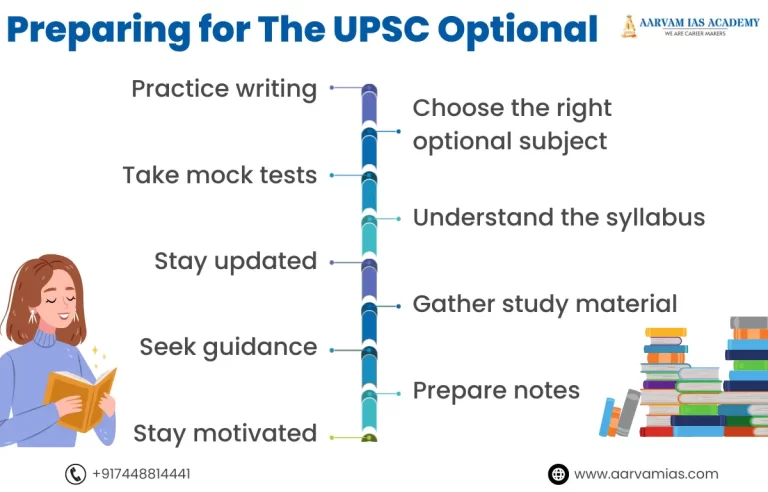General Studies holds greater significance in the IAS Mains exam. Among the total of 9 papers, 4 papers are specifically designated as General Studies. Additionally, the Essay paper, although loosely related to General Studies, encompasses topics from various subjects.
Here are the nine papers of the UPSC Mains General Studies:
This paper assesses the candidate’s ability to express their thoughts effectively and coherently on a given topic.
This paper covers topics such as Indian History, Heritage and Culture, and Geography of the Society and World.
This paper focuses on Governance, Constitution, Polity, Social Justice, and International Relations.
This paper covers Technology, Economic Development, Environment, Biodiversity, Security, and Disaster Management.
This paper examines Ethics, Integrity, and Aptitude, and includes topics like Emotional Intelligence, Moral Philosophy, and Case Studies.
Candidates have the option to select a single subject from a predetermined list presented by the UPSC. This paper is the first part of the optional subject chosen by the candidate.
This is the second part of the optional subject chosen by the candidate.
Candidates have to choose one Indian language from the languages listed in the Eighth Schedule of the Indian Constitution. The purpose of this paper is to evaluate the candidate’s level of proficiency in the selected language.
The objective of this paper is to assess the candidate’s proficiency in the English language.
It’s important to note that Papers VI, VII, VIII, and IX are only applicable if the candidate chooses an optional subject and an Indian language as per the UPSC guidelines.

UPSC CSE Mains General Studies I (Mains Paper II) Syllabus:
UPSC CSE Mains General Studies II (Mains Paper III) Syllabus:
UPSC CSE Mains General Studies III (Mains Paper IV) Syllabus:
UPSC CSE Mains General Studies IV (Mains Paper V) Syllabus:
The exam pattern for the UPSC Mains is structured as follows:
Paper | Subject | Total marks | Duration |
Paper A | Compulsory Indian language | 300 | 3 hours |
Paper B | English | 300 | 3 hours |
Paper I | Essay | 250 | 3 hours |
Paper II | General Studies I | 250 | 3 hours |
Paper III | General Studies II | 250 | 3 hours |
Paper IV | General Studies III | 250 | 3 hours |
Paper V | General Studies IV | 250 | 3 hours |
Paper VI | Optional I | 250 | 3 hours |
Paper VII | Optional II | 250 | 3 hours |
The UPSC Interview 2022 is set to take place between April 24th and May 18th, 2023. The official website has released a notification containing the schedule, which aspirants can refer to for further details.
The UPSC Notification 2023 was published on February 1, 2023. The Civil Services (Preliminary) Exam 2022 is slated for May 28, 2023. Following the announcement of the Prelims exam results, eligible candidates who have cleared the Prelims will be required to fill out DAF-I (Detailed Application Form) in order to appear for the UPSC Mains. The UPSC CSE Mains exam is scheduled to be conducted from September 15, 2023. However, the specific dates for the IAS Interview 2023 are yet to be announced and will be notified in due course.
UPSC Mains 2023 Exam Dates | 9 AM – 12 PM | 2 PM – 5 PM |
15 September 2023 | Essay Paper (Tentative exam) | – |
To be notified | General Studies-I (Tentative exam) | General Studies-II (Tentative exam) |
To be notified | General Studies-III (Tentative exam) | General Studies-IV (Tentative exam) |
To be notified | Indian Language Paper (Tentative exam) | English Language Paper (Tentative exam) |
To be notified | Optional Paper-I (Tentative exam) | Optional Paper-II (Tentative exam) |
The UPSC (Union Public Service Commission) mains general studies is important for several reasons:
General studies is a crucial part of the civil services exam, covering subjects like history, geography, economics, and current affairs. It equips candidates with the knowledge needed for administrative roles, fostering analytical and problem-solving skills essential for decision-making. Emphasizing current affairs, it keeps candidates updated on national and international events, crucial for effective governance.
With an interdisciplinary approach, it helps candidates connect different subjects, analyze issues from various perspectives, and tackle complex challenges. Additionally, general studies is a qualifying criterion, determining eligibility for further stages of the exam. Therefore, candidates must prioritize their preparation to build a strong foundation for the civil services.
These are the important points to remember about the Mains Exam:
As the impact of the optional subject is important, there is a need to choose the right option that is best for you! UPSC Coaching center in Chennai, the AARVAM Academy will guide you. Here are some crucial points: –
New to Aarvam ?Try our Demo Classes Free! Or Would Like to Know More About Exams?
